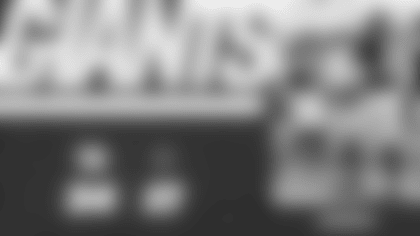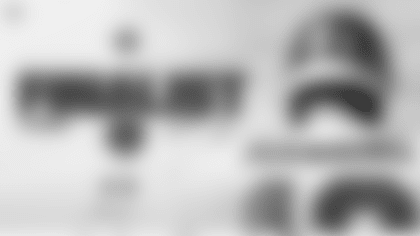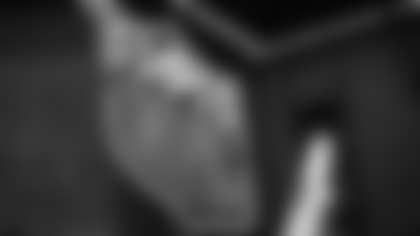Head Coach Tom Coughlin
The Seattle Seahawks – the way we look at them is that they are 3-0 at home. They have an incredible plus-eight in turnovers at home, 12 of their 13 takeaways are at home, they've averaged 27 points a game, they've given up 12 points a game, they have an incredible kickoff return average of 44.5 yards at home. They average over 10 yards per punt return at home. They've played very well. I think that everyone wants to make a big deal out of last weekend. The Raiders have played very well over the last two ballgames and that game at halftime was 10-0 and at the end of three was 16-0, so it was one-sided perhaps at the end score-wise, but it was a much closer game that than. We know very well the environment we're going into. It is a difficult place to play – it's loud, all of the above, so we're preparing for a team that is 3-0 at home, and I know that they will rally around the fact that they are going to play at home.
Q: What are you telling the guys about how to handle going to Seattle this week?
A: Well, we've been talking about it this morning when we introduced the team, we talked about it the other day after our Monday session. I think it's a knowledge thing, you've got to be aware of exactly what you're going into. The early forecast – 50s, low 50s. There's always wind, there's always the possibility of some kind of rain or whatever, so I think you just have got to prepare yourself for that. We're going to practice outside and the weather or the temperature should be close to what it will be there game time. They're a good football team, they're a talented football team. Certainly they have made some roster moves. They did that yesterday. We're aware of that, but this is a game where we have to be really, really focused because we know how difficult it is to go in there and win.
Q: Why do they have so much of a home field advantage?
A: I don't know what to tell you about that, but even if you look at the teams in the division, you look at the Chargers – two kickoff returns, two field goals. That's 20 points they got off of special teams in that game. Chargers were there – it was 27-20 and they were down there at the fringe of the red zone and they weren't able to put it in. I'm not going to make too big a deal about it. There's two teams that have got to play. I know how they'll come back to play after last weekend, so we have got to get ourselves really prepared for the kind of game it will be, it will be a very physical game and the fact that their special teams have done such an outstanding job is just one more thing that we have to be concerned about.
Q: You talked about their numbers at home – is that the widest disparity of any team?
A: I'm studying one team. The beauty about what we try to accomplish is that it's one at a time and that's all I care about.
Q: Is the overall structure of the Seahawks similar to any other team you've played?
A: No. There are some very unique capabilities on the part of this team.
Q: Such as?
A: The way in which…their personnel, number one. Their explosiveness, their explosiveness on special teams, the way they try to provide for that and set that up, the fact that at home they've really done – they're plus-two anyway – but at home they've really been able to take care of the ball and get takeaways.
Q: What's your assessment of Eli – turnovers, etc. and where he is now and what you are working on there in terms of any common theme?
A: Well, we did – not just with Eli – but we've gone over all of the information that we have from self-scout based on our first seven games. We usually flip it, like I have explained to you in the past. It's called a worst to best, so we rank them that way and then we try to take pieces of those four or five things that are at the top of our list and make sure the players are well aware of that. We've talked about it, we've looked at it. You know, when I look around the league, I look at, when I'm studying Seattle, the tipped ball interceptions. It's an incredible thing. Don't ask me why, but it's all over the place. It's like a damn plague. The ball is thrown, the ball is tipped – sometimes it's not a ball that's thrown behind, it's a ball that's catchable, but it comes out of somebody's hands. There are certainly some examples of some unbelievable plays that they've been able to take advantage of – the other day Oakland got a couple of them, too.
Q: Is Eli throwing it any higher than he has in the past?
A: I think at the start of the (Dallas) game he may have been a little high, but that was – I'm telling you – when you've got somebody in your face, it's really difficult not to do that. When we started the game the other day or whenever that was, there were players in his face in the first series, bang, bang, bang, and probably in the first two series until we settled down and did a better job of keeping people out of his face.
Q: Seattle's return unit is very good. What did you see from your coverage units so far when you did your self-scout?
A: Well, I still continue to say that our kickoff coverage is improving. Our punt coverage wasn't very good and there were reasons for that – people were out of their lanes, we weren't playing off of one another, we didn't push the ball into anybody. We kind of got two people spaced outside of a blocker and one couldn't get back in and recover, so we spent time on that as well.
Q: As a former receivers coach, does the tipped ball phenomenon drive you particularly nuts?
A: As a former anything, that drives me crazy, yeah. The turnovers drive me crazy.
Q: There's no coaching solution to the tipped balls.
A: Yeah there is. Catch it. Catch the thing.
Q: But they're trying. If they don't catch it, it's a tipped ball. You can't coach them out of it.
A: Catch it. Don't be surprised by it. Get your eyes on the ball. Know what's happening there. You have to say this now – there's been some incredible athletic moves on the part of people intercepting balls, whether they're low, whether they're high, whether they're one-handed – we've seen a lot of that this year. Not just with our team.
Q: How much has Marshawn Lynch helped their run game?
A: He's helped them a lot. He and Forsett are quite a pair and if they put Washington in there, he certainly compliments it as well.
Q: Is there a pattern to how they're using Lynch?
A: I don't know about a pattern. They both have opportunities throughout the game. I imagine it's the hot hand thing. It's by play sometimes. You can tell by play.
Q: Any decision on O'Hara?
A: We'll see. We're going day by day.
Q: Will he practice today?
A: He's not going to work today, no.
Q: Is there any worry about Adam Koets at center in Seattle, a place that gives O lines so much trouble with the noise?
A: I don't think there's any more concern than there would normally be. The problem is that as you're talking about silent count, you're talking about being able to see and move and all those types of things – poise in the noise is a big factor.
Q: Everyone else in the NFC East has QB issues. You don't. What does that do for you?
A: It certainly helps your playing. I'll tell you that. It's a great, great asset that (Eli) possesses. He plays through things, too. He'll play hurt.
Q: Do you place a particular emphasis on catching the ball in practice?
A: Well we've spent a lot of time talking to the individuals who are involved – basically game by game, postgame, but it's a team thing, as I've mentioned. You've got to keep people out of the quarterback's face as well. We've spent as much time talking about turnovers and dramatically showing how a game is won and lost many times… I don't know if the English language lets me go any further. You're asking things that… We work with them every day. We're not practicing volleyball drills, just to let you know that.
Q: Would you practice outside in the rain this week to prepare for possible rain in Seattle?
A: Depends on… I like the quality of practice. We can go out and put the ball in the water and do that kind of stuff or go inside and do it, but I want to make sure that we get the quality of practice that it should be and then we'll go play in whatever shows.
Q: Alex Hall – did you see anything else from him on film?
A: No. We know the player pretty well.
Q: Is Reynaud still your return man?
A: At this point, yes. But we do have some guys that have done that before and are anxious to want to do it again. We have 11 guys, no matter who we put out there, that are responsible for those returns. We haven't given him a lot of help.
Q: Hedgecock?
A: He's going to go a little bit more than beyond the individual today.
Q: Will Bear stay at fullback?
A: We'll see how that goes.
Q: Beatty?
A: Beatty, no. Not yet.
Q: Gerris?
A: Gerris is practicing every day, but he's got to wear this pillow.
Q: Are you any closer to a decision on Boothe?
A: We have more time. We have some more time. He's going to get a full workload though. There's not going to be any restrictions on him on number of snaps or anything today. He's run and conditioned all last week, so I think he's well prepared for this.
QB Eli Manning
Q: What's your greatest concern about the Seahawks?
A: They're a talented team. They play great defense, and they do a great job, especially at home, of getting turnovers. They get sacks, they're talented, they're 3-0 at home. We know going in there that they're a tough team and we have to be ready to play.
Q: They play in a loud stadium…how's that going to factor in?
A: Well hopefully it won't. It's a great challenge for us, and we've played out there before. We've played in loud places before so we know what to expect and how we have to prepare this week to get ready.
Q: How can you make things easier for Adam Koets if he steps in?
A: Get the ball snapped. It shouldn't be a problem with the center, he should be able to hear me fine. It shouldn't affect our offense in any way.
Q: Was the bye week good for you, did you have any bumps or bruises that needed to heal?
A: You're always banged up after seven weeks into the season. It's about healing the mind and feeling rested, coming in refreshed, and knowing we have a lot of football to be played. This week we have a long trip out to Seattle, so it's been good for the team.
Q: How do you make sure that you go out there and perform the way you did before the bye week?
A: It's good to get a week off and rest your body and mind, and get away from things for a second. We came back and had a good practice Monday, I saw good energy. Today again, we had good energy and concentration from the guys, good focus, and we got better today.
Q: One of the things Seattle has is a good red zone defense. What do you see from them there?
A: They tighten up. They're not giving away anything, either. They have sacks down there and they have some turnovers I've seen. Any time that you get down to the red zone, everything has to be perfect. You have to block things up, the routes have to be very precise, the throws have to be on the money, so we have to make sure everything is run and done exactly the way we practice it, and have a great plan for it.
Q: Tom was talking about getting receivers to focus on the ball and limit tipped passes. Is that something you're trying to hone in practice?
A: Yeah, we have to make sure we are watching everything and not running before we catch the ball or looking at the defenders. You know that part of it is on me. I have to make sure the ball is down low and I'm not leading them into headaches or throwing things high where there is a possibility of getting tipped up. All of us can work on trying to eliminate those possible plays that might turn into an interception.





